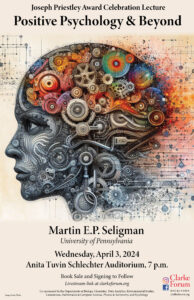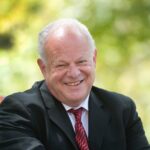 Anita Tuvin Schlechter Auditorium, 7 p.m.
Anita Tuvin Schlechter Auditorium, 7 p.m.
Joseph Priestley Award Celebration Lecture
Positive Psychology & Beyond
Martin E.P. Seligman, Zellerbach Family Professor of Psychology and
Director of the Positive Psychology Center at the University of Pennsylvania
Agency is a psychological state that has changed the course of history and it is the immediate cause of progress and innovation. In the absence of this mindset, humanity stagnates.
Agency is the belief that I can influence the world, made up of three components: efficacy, optimism, and imagination. Efficacy is the expectation that I can achieve a specific goal now. Optimism is how long into the future I believe I can achieve that goal. Imagination is the range of goals that I believe I can achieve. Efficacy causes trying hard; optimism causes persistence, and imagination causes innovation. These are the mechanisms by which Agency causes progress.
Progress over the sweep of human history has been viewed through the lens of economics, ecology, theology, ‘great man’ biography, and ‘social force’ history, but almost never, until this book, through the lens of psychology.
Over the last 14000 years there have been several psychological epochs in which agency changes radically to keep pace with new social and material demands. Before writing, we can infer agency from behaviors such as the control of fire, burial practices, and the invention of agriculture. The first epoch for which we have writing is the Divine Age in which the gods command and we humans obey. We have limited agency and not even much ‘self.’ Then, after the Bronze Age, between 1100 BCE and 600 BCE, the balance between the agency of the gods and of humans tilts toward humans. Greece develops much expanded Agency by 400 BCE with considerable efficacy, considerable optimism, and enormous imagination. Material, technological, artistic and political progress all follow from this Agentic self. This is true, and at about the same time, of Greece, of the Judeo-Christian Bible, and of China. Chinese history adds the importance of the balance between “I” agency and “We” agency.
As Rome declines, the theology of Augustine, in which only God has true Agency, looms large. The quality of human life in the West becomes miserable and life stagnates for almost one thousand years. Very little is invented, but then, around 1450 CE, progress in the West, but not elsewhere, restarts as humans re-acquire substantial Agency. The printing press, the New World, Michelangelo and Shakespeare appear. Sadly, the Reformation in 1525 abandons free will and progress in Europe grinds to a halt. With the overthrow of Puritanism in England in 1660, progress resumes. Newtonian science, vaccination in medicine, true wealth in capitalism, and political revolution all stem from this rebirth of Agency. Agency democratizes, particularly in America, during the Industrial Revolution of 1800, and an unprecedented Age of Progress occurs. By 2000 Agency becomes almost universal as technology explodes. After 1950, progress in civil rights for Black Americans is accompanied by a substantial increase in Agency. So too for Women.
The world is now in labor, about to birth an Age of Agency populated by fully Agentic individuals who peer far into the future in order to flourish. If potential barriers—nuclear war, pandemic, climate catastrophe, racial warfare, and financial collapse—can be overcome, this will be our first Age of Well-being.
The Joseph Priestley Award recipient is chosen by a different science department each year. The Department of Psychology selected this year’s recipient. The event is supported by the Priestley Fund and is sponsored by the Clarke Forum for Contemporary Issues and co-sponsored by the departments of biology, chemistry, data analytics, geosciences, environmental studies, mathematics & computer science, psychology, and physics & astronomy.
Topic overview written by Layla Ilarraza ’26
Biography (provided by the speaker)
 Martin E.P. Seligman is the Zellerbach Family Professor of Psychology and director of the Positive Psychology Center at the University of Pennsylvania, where he focuses on positive psychology, learned helplessness, prospection, optimism and positive education. He is a best-selling author of several books, including Flourish. His recent book, The Hope Circuit, is his autobiography. He received the American Psychological Society’s William James Fellow Award for basic science, the Cattell Award for the application of science, and three Lifetime Distinguished Scientist awards from the American Psychological Association. In 1996, Seligman was elected president of the American Psychological Association by the largest vote in modern history. He was named the single most influential psychologist in the world by Academic Influence.
Martin E.P. Seligman is the Zellerbach Family Professor of Psychology and director of the Positive Psychology Center at the University of Pennsylvania, where he focuses on positive psychology, learned helplessness, prospection, optimism and positive education. He is a best-selling author of several books, including Flourish. His recent book, The Hope Circuit, is his autobiography. He received the American Psychological Society’s William James Fellow Award for basic science, the Cattell Award for the application of science, and three Lifetime Distinguished Scientist awards from the American Psychological Association. In 1996, Seligman was elected president of the American Psychological Association by the largest vote in modern history. He was named the single most influential psychologist in the world by Academic Influence.
Related Links
authentichappiness.org
Ask Martin: 144.34.162.226:5000 username : martin , password : 1234567890
Joseph Priestley Lecture
The Joseph Priestley Award is presented by Dickinson College in memory of Joseph Priestley, discoverer of oxygen, to a distinguished scientist whose work has contributed to the welfare of humanity. The award, first presented in 1952, recognizes outstanding achievement and contribution to our understanding of science and the world.
